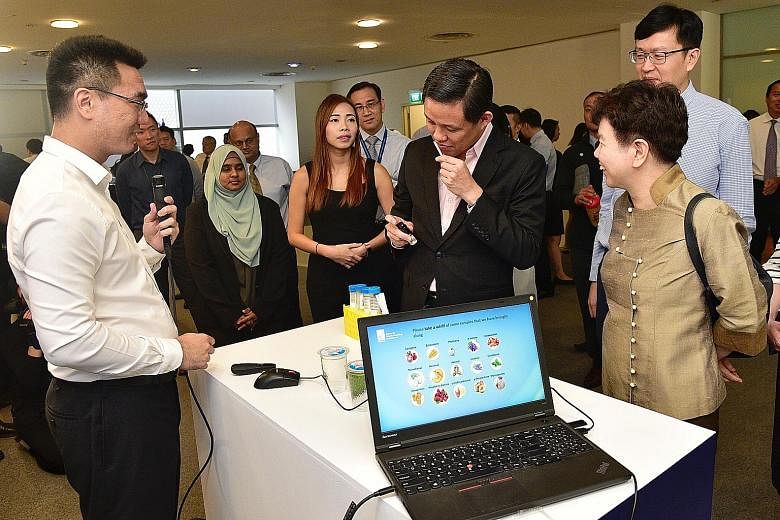Singapore will continue to develop the skills of its local workforce and maximise the potential of the best in the country while, at the same time, welcoming talent from overseas to work alongside Singaporeans in globally competitive teams.
These elements are part of Singapore's talent strategy outlined yesterday by Minister for Trade and Industry Chan Chun Sing at the Agency for Science, Technology and Research (A*Star) Scholarship Award Ceremony at the Matrix building in Biopolis.
He said that the first and most important element of the strategy is to "cultivate and grow our Singaporean talent pool".
In today's economy, Singaporeans must be lifelong learners and continuously upgrade their skills, and Mr Chan cited the SkillsFuture Training Subsidy as one way through which the Government is supporting companies and workers with training options and subsidies to stay relevant.
Singapore also invests to stretch the top tier to excel to their full potential, and the A*Star scholarships are part of the wider national strategy to do so, said Mr Chan.
Singapore will continue to build a strong local talent base in areas such as science and technology, where currently 70 per cent of research scientists and engineers are citizens or permanent residents.
Mr Chan noted that A*Star has contributed significantly to Singapore's efforts in nurturing the country's talent base, having produced around 1,600 Singaporean PhD talents through various scholarship schemes that contribute to innovation here.
But to compete effectively in the world, teams must be globally competitive, Mr Chan said.
This was especially critical at a time when the global econo-mic environment was becoming fragmented.
"Singapore must continue to welcome global talent to work alongside Singaporeans in globally competitive teams and advance the frontiers of innovation together," he said.
Citing Hong Kong and France as examples of places that are aggressively attracting companies and talent with marketing campaigns and fast-track visa schemes, Mr Chan said that Singapore needs to do the same. Hong Kong launched the Technology Talent Admission Scheme to attract science, technology, engineering and mathematics talent, while France revamped its French Tech Visa to make it easier for French start-ups to access skilled manpower.
To encourage strong, dynamic and fast-growing companies to set up and grow in Singapore, "we will need to assure them that they will have access to highly skilled global talent, both Singaporean and non-Singaporean", he said.
Welcoming highly skilled manpower from other countries, especially those with high-end digital and engineering skills, to complement the local workforce with new and updated skill sets is crucial to Singapore's longer-term competitiveness, he added.
Another aspect of the talent strategy is to ensure that Singapore remains connected to the world with programmes such as the Global Innovation Alliance (GIA) and the Global Ready Talent Programme (GRTP).
The GIA is a global network allowing Singaporeans and businesses to gain overseas experience, connect, and collaborate with their overseas counterparts. The GRTP provides funding support to companies to send locals for overseas internships and management associate programmes.
Finally, Mr Chan said Singapore should welcome South-east Asians and returning Singaporeans as talent, and one way to do this is through online communities.
Singapore needs more Singaporeans who have had the benefit of a good overseas experience to develop global mindsets and global skills, said Mr Chan.
As an example, he cited Mr Glenn Low, 31, who interned with American advertising platform start-up Rocket Fuel when he was at university here, and was offered a position by the firm after graduation.
He and his then girlfriend, who is now his wife, spent the next few years in the United States gaining professional experience, but two years ago, he relocated back to Singapore, where he now works as a senior strategist with Google.
Technology and talent underpin Singapore's ability to successfully execute strategies to navigate shifts in the global and local environments, said Mr Chan.
"As A*Star scholars, you are at the centre of both," he told the audience, which included close to 100 of this year's scholarship recipients.


